In San Francisco, issuing a “Notice to Enter an Apartment for Repairs” is a legal requirement designed to protect both tenants and landlords. This notice ensures transparency, allowing tenants sufficient time to prepare for the entry of maintenance personnel while giving landlords the right to access the property for necessary repairs. Typically, a 24-hour notice is required, except in emergencies, when immediate access is permitted. Understanding the regulations surrounding this notice helps maintain a healthy landlord-tenant relationship, ensuring repairs are handled smoothly and in compliance with local laws.
Introduction
As a tenant or landlord in San Francisco, understanding the legal framework surrounding apartment repairs and property access is crucial. The “San Francisco Notice to Enter an Apartment for Repairs” is one such document that plays a vital role in ensuring transparency, communication, and legal compliance. Whether you are addressing a leaky faucet, a malfunctioning appliance, or major structural work, knowing when and how to issue this notice can make all the difference in fostering a respectful and lawful tenant-landlord relationship.
What is a Notice to Enter an Apartment for Repairs?
A notice to enter an apartment for repairs is a formal document issued by a landlord or property manager, informing the tenant that access to the unit is required for repair work. In San Francisco, this notice is regulated by both state and local laws, which define the requirements for timing, reason for entry, and how the notice should be served.
Why is a Notice to Enter Required?
In San Francisco, tenants have a right to privacy in their homes, and landlords must respect this right. A notice to enter ensures that tenants are not caught off guard and have ample time to prepare for the landlord’s entry. This notice is also essential for landlords to meet their legal obligations without risking a lawsuit for unlawful entry or invasion of privacy.
Legal Requirements for Issuing a Notice in San Francisco
San Francisco follows California’s Civil Code Section 1954, which outlines the rules for when and how landlords can enter rental properties. Here’s what landlords and tenants should know:
- Notice Period: Landlords must provide a minimum of 24 hours notice before entering an apartment for repairs unless there is an emergency such as a fire or water leak.
- Delivery of Notice: The notice must be written and can be delivered in person, by mail, or electronically. If delivered by mail, it should be sent at least six days before the intended entry.
- Reason for Entry: The notice must clearly state the reason for the landlord’s entry. Legitimate reasons include performing repairs, showing the unit to prospective tenants or buyers, or conducting a safety inspection.
What Should Be Included in the Notice?
The “San Francisco Notice to Enter an Apartment for Repairs” should include key details to ensure compliance with local and state laws. These include:
- The reason for the entry (e.g., repairs, inspection, showing the property)
- The date and time when the landlord intends to enter the apartment
- The name of the person who will be entering the property (landlord, contractor, etc.)
- A signature from the landlord or property manager
By including all of these components, both parties are protected, and any potential misunderstandings can be avoided.
When Can a Landlord Enter Without Notice?
While the general rule requires at least 24 hours’ notice, there are situations where immediate entry is allowed. In cases of emergency—such as fire, flooding, or other conditions that threaten the health and safety of the tenant—landlords may enter without providing prior notice. These situations are rare but important exceptions to the rule.
Tenant Rights During Repairs
Tenants in San Francisco have specific rights that protect them during the repair process. Here’s what tenants should expect:
- Advance Notice: As mentioned earlier, tenants must receive at least 24 hours’ notice unless it is an emergency.
- Minimal Disruption: Repairs should be conducted in a way that causes the least disruption to the tenant’s daily life.
- Temporary Relocation: In some cases, major repairs may require tenants to vacate the property temporarily. Landlords may be required to cover the cost of temporary housing if the unit becomes uninhabitable.
Consequences of Failing to Provide a Notice
For landlords, failing to provide proper notice can lead to serious legal consequences. Tenants who feel that their privacy has been violated can file a complaint with the San Francisco Rent Board or pursue legal action. Landlords may face fines or other penalties if found in violation of state or local laws.
How to Handle Tenant Objections
It’s not uncommon for tenants to have concerns about the timing or necessity of repairs. In such cases, communication is key. Tenants can negotiate the time of entry if the proposed schedule conflicts with their availability. However, tenants cannot deny the landlord’s legal right to enter if proper notice has been given, and the repairs are essential for maintaining the property.
Conclusion
Navigating the rules around the “San Francisco Notice to Enter an Apartment for Repairs” requires careful attention to detail from both landlords and tenants. Clear communication, compliance with legal requirements, and respect for tenant privacy are essential for maintaining a healthy landlord-tenant relationship. By understanding the rules and adhering to them, both parties can ensure that repairs are conducted smoothly, efficiently, and in compliance with San Francisco’s laws.
For More Visit, Viraltimes.co.uk







